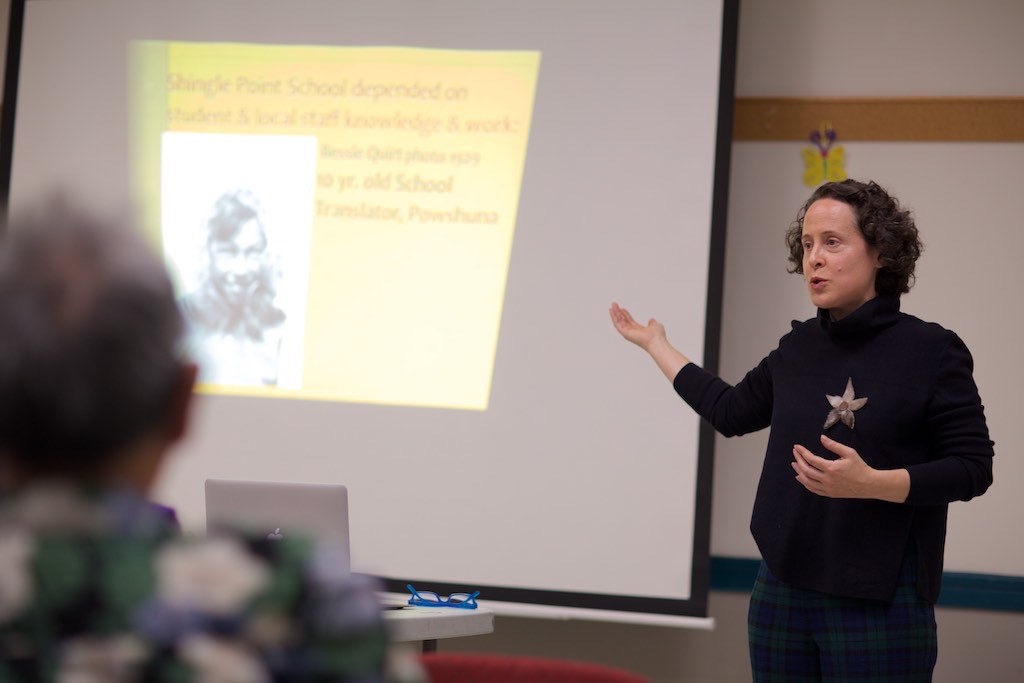When James Morrison was growing up in Economy, Nova Scotia, in the 1950s, his father was often known to entice local characters and storytellers into the family home. “He wasn’t a storyteller,” says Dr. Morrison, “but he loved to hear stories. Eventually of course, I went off to university, and decided that those stories and that kind of knowledge weren’t very important—but I came back around.”
And then some. Dr. Morrison, who this past year became Professor Emeritus of History after nearly 40 years at Saint Mary’s, has spent much of his career developing the field of oral history in Canada, and becoming one of its most prominent and important advocates.
“Growing up where I did,” he says, “I’m sure it put me even subconsciously in the mindset that this kind of folklore, when accepted for what it is, absolutely constitutes a record of history.”
Dr. Jim Morrison at a gathering in the International Education Centre with students Maria and Juan Canales (wearing traditional Chilean dress) of Halifax. 1980. University Archives
First, however, Dr. Morrison turned to the world. He first studied History and English at Acadia University, where he developed an interest in social-political issues within Nova Scotia, especially those affecting marginalized populations and the African-Nova Scotian community. He then earned a Commonwealth Scholarship to study at Nigeria’s University of Ibadan, graduating in 1976 after working on oral traditions in the Nigerian highlands as part of his thesis work. From there, he returned to Canada and began working with Parks Canada as an oral historian, compiling an oral history of Kejimkujik Park.
Finally, in 1979, Dr. Morrison began his career at Saint Mary’s, coming on board as Executive Director of the International Education Centre (IEC)—an early example of what would become Saint Mary’s hallmark dedication to international education and outreach.
“It’s wonderful how Saint Mary’s has continued down this path,” says Dr. Morrison. “When I began the IEC was the only game on campus in terms of international studies. We had speakers’ programs in schools, with graduate students from around the world making presentations and raising the interest level of people locally in what was happening globally.”
Dr. Morrison later became Dean of Arts in 1983 until 1989, and in 1988-89 (and again in 2001) served as Program Coordinator of the International Development Studies program, and was Coordinator of the Asian Studies program at various points between 1992 and 2012. From 1990 onwards, he served as a Professor of History and taught courses on South East Asia, India, African, Atlantic History as well as oral history and ethnic/cultural history of Nova Scotia.
Dr. Morrison has balanced these on-campus commitments with a similarly impressive record of community service. He has been President and Vice-President of the Royal Nova Scotia Historical Society, a historian and archivist with Frontier College since 2000, and an advisor for the Black Cultural Centre for Nova Scotia and the Black Loyalist Museum. Since 2007 he has been a member of the Advisory Committee on the Interpretive Master Plan for Heritage in Nova Scotia.
Dr. Jim Morrison discusses education in developing countries with Dr. John Orkar on the weekly Halifax cable TV show 'Your World'. 1980. University Archives.
One of his most significant achievements was his work, between 1997 and 2011, as an advisor and historian with the Canadian Museum of Immigration at Pier 21, which would later become the first national museum outside of Ottawa. “Museums are one of the institutions that the public trusts the most,” says Dr. Morrison. “Developing this infrastructure is tremendously important.”
In the 1990s, Dr. Morrison conducted some of the first interviews with individuals sent to Canada as children during World War 2, as well as medical personnel and customs officials, helping to put together the nascent museum’s first exhibits, based significantly on oral history, an achievement of which Dr. Morrison is justly proud.
“When I was in Africa, we were coming out of a long period in which the history of the elites was regarded as the only real history—military and political history, the history of the powerful. And that’s important and crucial, but the history of others, women, labour leaders, farmers, and ordinary people, were always missing from these accounts. Oral history is not a matter of putting a microphone in front of someone and simply taking what they say at face value, but when done properly, it is of critical importance. And, there is a broader acceptance of it now than ever.”
Dr. Morrison was recognized in 2009 with the Order of Canada for “lasting contributions to his province and to the field of historical research.” In 2013, he was awarded a Queen Elizabeth II Diamond Jubilee medal in recognition of his research and advocacy on immigration and oral history.
He has also been the recipient of many fellowships and accolades, including Senior Visiting Fellow at Singapore’s Institute of Southeast Asian Studies (1989-90), Visiting Scholar at Hokkaido University of Education (1996, 2004), and a Visiting Fellow at Jawaharlal Nehru University (1999).
Finally, his impressive publication history includes authorship and editorship of 13 books and monographs, as well as many papers, editorials, reviews, and other vital contributions to the study of history in Nova Scotia and beyond.
Dr. Morrison’s career has mirrored so many of Saint Mary’s strengths—community and international outreach especially. And it is still not finished. He continues to juggle multiple projects, including annotating the logbook kept by a Minas Basin schooner captain from 1894 to 1901, a biography of the founder of Frontier College, Alfred Fitzpatrick and editing the diary of a Queens County farmer dating from the 1870s to the 1930s.
“ I have always felt that history may never end all our differences but it may help us make the world safe for the diversity that is all around us.”
















